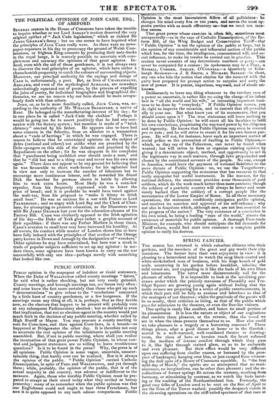THE POLITICAL OPINIONS OF JOHN CADE, ESQ., OF ASHFORD.
SEVERAL orators in the House of Commons have taken the trouble to inquire whether or not Lord AsatEy's motion deserved the very original epithet of Jack Cade legislation," which so tickled Sir JAMES GRAHAM'S fancy : but no one seems to have inquired what the principles of JACK CADE really were. As there were no news- paper-reporters in his day to preoccupy the ground of Welsh Com- missions, or frighten Ring-consorts by producing their note-books in the royal barge,, it is scarcely. possible to ascertain with com- pleteness and accuracy the opinions of that great agitator. In- deed, even with the aid of those gentlemen, it is not always easy to discover the real principles of an agitator, which have rather a chameleonish propensity to catch the colours of surrounding objects. Moreover, our principal authority for the sayings and doings of CADE is, unfortunately, a poet. But, as lives of CHARLEMAGNE, ABELARD, and even of the mythological ACHILLES, are nowadays unhesitatingly squeezed out of poems, by the process of expelling the juice of poetry, for individual biographies and biographical dic- tionaries, we see no reason why our hero should be more scrupu- lously dealt with than others.
JOHN, or, as he is more familiarly called, JACK CADE, was, ac- cording to the authority of Mr. WILLIAM SHAKSPERE, a native of Rent. He belonged to the manufacturing-interest of his day ; for in one place he is called "Jack Cade the clothier." Perhaps it would be going too far to assert positively that he had any con- nexion with the factory system ; but mention is made of a " brick chimney" erected by his father. He appears also to have had some concern in the fisheries, from an allusion to a transaction about a "cede of herrings" in which he was engaged. There is reason to believe that, he entertained opinions on the subject of debts (national and others) not unlike what are preached by the Debt-spongers on this side of the 'Atlantic and practised by the Repudiators on the other ; for he was eloquent in his complaint that "parchment being scribbled over should undo a man," and that he " did but seal to a thing once and never was his own man again." There does not appear to be any ground for believing that he was favourable to short work-hours ; for his agitation bad in view not only to increase the number of labourers but to encourage more continuous labour, and he rewarded his friend Dick the butcher for prowess shown in battle by allowing him to work' extra hours. Most likely he was a corn-law repealer, from his frequently expressed wish to lower the price of bread; and it is probable he would have voted against the malt-tax, from his proposal to "make it felony to drink small beer." He was as anxious for a war with France as Lord PALMERSTON ; and as angry with Lord Say and the Clerk of Chat- ham, for attempting to promote education, as the Dissenters were with Sir JAMES GRAHAM last year for the education-clauses of his Factory Bill. CADE was virulently opposed to the Irish agitation of his day—the Duke of York gives rather a graphic account of their squabbles : if there was any Father Mathew in those times, CADE'S aversion to small beer may have increased his hostility. At all events, his conduct while master of London shows him to have been fully imbued with the principles of that section of the Orange party known in Down and Armagh by the designation of" wreckers." Other opinions he may have entertained, but here was a stock in trade of popular subjects sufficient to set up any agitator : in mo- dern times, some agitators have been known to carry on the war successfully with only one idea—perhaps merely with something that looked like one.


























 Previous page
Previous page